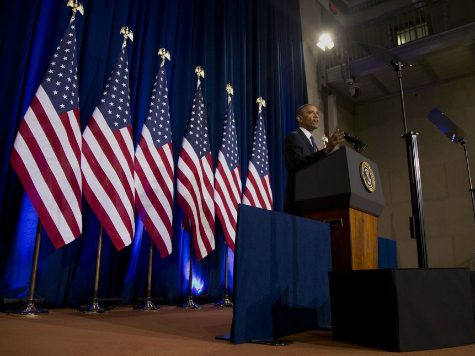
The New York Times reported Tuesday morning that the Obama administration is planning legislation that would limit the amount of private call information the National Security Agency could retain from phone companies and require the NSA to go through a special court for permission to spy.
In what the newspaper is calling a “far-reaching overhaul,” the President is set to propose an end to bulk information collection that required telephone companies to keep caller information for up to five years. They would now only have to keep information like to whom calls were made and for how long for a period of eighteen months, the same amount they would have had to keep the information before post-9/11 reforms that expanded the power of the NSA.
The reforms would also require that the NSA use a “new kind of court order” to gain permission to spy on an individual, and would have to show evidence that led them to believe an individual was suspicious. The Washington Post adds that the likely court for such an order will be the Foreign Intelligence Surveillance Court, which oversees the current operations.
The court orders would still require, however, that phone companies immediately hand over the demanded information if approved, including records for callers up to two phone calls removed from the original suspicious individual. Nor would it require approval to track a specific phone number, but rather, an individual. The proposal currently in Congress also differs from what the White House would prefer in that it does not require a judge to approve every individual data search, but rather the search on every individual.
The reforms would only affect the NSA – the CIA and other covert operations would remain intact, and the current NSA program has been renewed for at least another 90 days until legislators propose a complete bill.
These proposed changes to data collection arrive after a year of turmoil in the intelligence gathering community, as former NSA worker Edward Snowden revealed the scope of the NSA’s spying initiatives, which included spying on the United Nations and members of Congress. The reforms follow months of protest from American citizens concerned about their privacy and a class action lawsuit led by Senator Rand Paul.
In response to the complaints, President Obama convened a special advisory council on the matter, which recommended a number of the reforms being pursued in this latest effort, most prominently the call for not keeping bulk phone records and having another level of oversight over the NSA to prevent indiscriminate spying.
While the announcement is promising for civil libertarians who hope for an end to the spying program, drafting the proper legislation is expected to take months, and the program will continue in its current form for at least 90 more days.

COMMENTS
Please let us know if you're having issues with commenting.